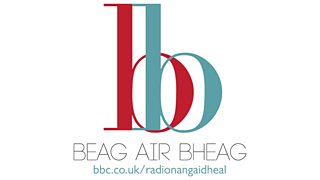Oisean a’ Ghrà mair Sreath 10: 4
Criomag: Iain MacAmhlaigh & Calum Aonghas MacAoidh (‘Sianar aig Bòrd’)

1. Sèimheachadh (lenition of consonant) airson ‘of’
Iain:
“’S ann à Earra-Ghàidheal a bha e, à sgìre Thaigh an Uillt.”
“He was from Argyll, from the Taynult area (the area of Taynult).”
“ ’S ann à Muile a bha John Maclean is bha Gàidhlig Mhuile aige agus bha Gàidhlig Earra-Ghàidheal aig mo sheanair.”
“John Maclean was from Mull and he had Mull Gaelic (the Gaelic of Mull), and my grandfather had Argyllshire Gaelic.”
Gàidhlig Earra-Ghàidheal - (the) Gaelic (of) Argyll, Argyllshire Gaelic
Baile Inbhir Nis - (the) city (of) Inverness, Inverness city
Sgìre Ùig - (the) area (of) Uig, the Uig district
Ach ‘of + consonant’: sèimheachadh bh, ch, dh, fh, gh, mh, ph, sh, th,
Gàidhlig Bharraigh - the Gaelic of Barra, Barra Gaelic
bailtean Chataibh - the townships of Sutherland
Caisteal Dhùn Bheagain - the castle of Dunvegan, Dunvegan Castle
tramaichean Dhùn Èideann - the trams of Edinburgh, Edinburgh’s trams
mac Fhionnlaigh (MacFhionnlaigh) - the son of Finlay, Finlay’s son (Mackinlay)
baile Ghlaschu - the city of Glasgow
Gàidhlig Mhuile - the Gaelic of Mull, Mull Gaelic
Muinntir Pheairt - the inhabitants of Perth
sgìre Shruighlea - the area of Stirling, the Stirling area
sgìre Thaigh an Uillt - the district of Taynult (‘Burn House’)
2. A + sèimheachadh (lenition) airson ‘going to’, etc
Iain:
“John Maclean seo, bha e fada, fada an aghaidh deoch ach bhiodh e a’ tighinn dhan taigh-sheinnse a bhruidhinn ri mo sheanair ann an cùlaist bheag.”
“This John Maclean, he was totally opposed to drink but he would come to the pub to talk to my grandfather in a wee backroom.”
a’ tighinn a (‘coming to’), a’ dol a (‘going to’), a’ falbh a (‘going away to’)
Bhiodh e a’ tighinn a bhruidhinn ri mo sheanair.
“He used to come to speak to my grandfather.”
Bha mi a’ dol a bhruidhinn riut ‘I was going to speak to you.’ dol a bhruidhinn riut, le sèimheachadh.
Going to speak to you.
Tha sinn a’ dol a choinneachadh ri chèile.
‘We’re going to meet each other, meet up.’
Cuin a thig thu a dh’fhaicinn a’ bhèibidh?
‘When will you come to see the baby?
+ fuaimreag: a dh’
Tha mi a’ falbh a dh’èisteachd ris na còisirean.
‘I’m going off to listen to the choirs.’
Tha iad a’ dol a dh’àrdachadh mo thuarastal.
‘They’re going to raise my salary.’
Dh’fhalbh e a dh’innse dhaibh.
‘He went off to tell them.’
Dìreach coltach ri a’ dol a + ainm-àite | Exactly like ‘going to’ + placename:
Tha sinn a’ dol a Shruighlea. ‘We’re going to Stirling.’
Thàinig iad a Phort Rìgh. ‘They came to Portree.’
Bha iad a’ falbh a dh’Aimeireaga. ‘They were going off to America.’
3. ’S e *** a tha ORM. ‘I’m called ***’
Iain:
“ ’S e Seonaidh a bh’ airsan cuideachd, ach Mac’illeNaoimh no MacNiven. Agus sin an t-ainm a th’ ormsa chun an latha an-diugh. ’S e John MacNiven MacAmhlaidh a th’ orm.”
He was called Seonaidh too [It’s Seonaidh was on him too], but MacNiven. And that’s what I’m called [that’s the name that’s on me] to this day. I’m called John MacNiven MacAulay.”
Dè an t-ainm a th’ ort? ‘What's your name?’ (‘What name ‘s on you?)
’S e John MacNiven a th’ orm. ‘I’m called John MacNiven.’
’S e Màiri a th’ ormsa. ‘I’m called Mary.’
’S e Màiri Bheag a th’ aca orm. ‘They call me Wee Mary.’
’S e Am Fasgadh a bh’ aca air an taigh. ‘They called the house The Refuge.’

